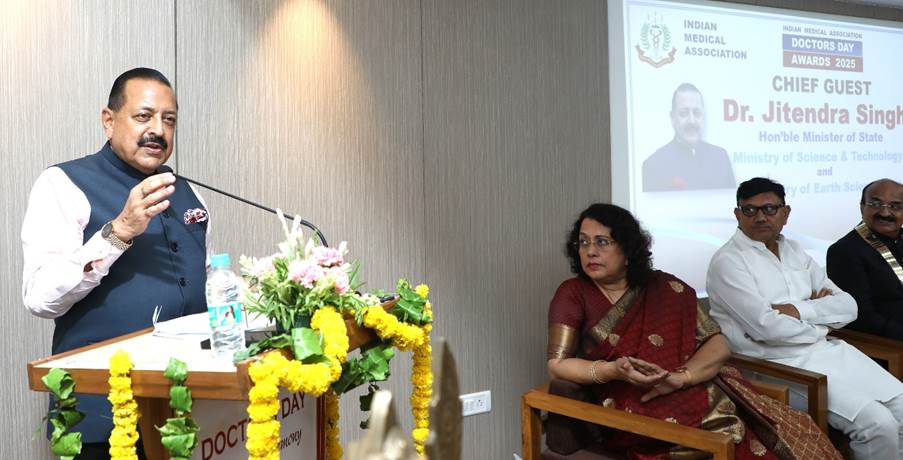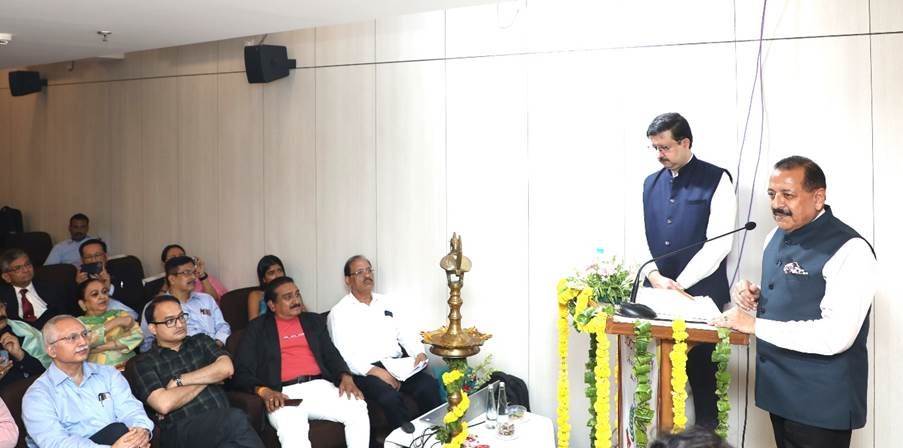Union Minister Dr. Jitendra Singh highlighted India’s growing leadership in medical science, citing the DNA vaccine, gene therapy trials, and the development of indigenous antibiotics like Nafithromycin recent breakthroughs. He also pointed to emerging biobanks and genome repositories as critical to future research.

FinTech BizNews Service
Mumbai, July 13, 2025: Paying rich tribute to Dr Bidhan Chandra Roy, the world-renowned physician and doyen of medical academics, Union Minister Dr. Jitendra Singh today invoked Dr B.C. Roy's legacy to emphasise the importance of restoring doctor-patient trust which was the hallmark of Dr Roy's era in the first half of the 20th century.
Dr. Jitendra Singh, as the Chief Guest, was speaking at the Doctors’ Day celebration organized by the national body of the Indian Medical Association (IMA) here.

The event was attended by IMA National President Dr. Bhanushali, President-Elect Dr. Naik, Immediate Past President Dr. Asoken, and other national office bearers of the IMA.
Addressing a packed audience of medical professionals, Dr. Jitendra Singh invoked the legacy of Dr. B.C. Roy, reflecting on his immense contribution to both medicine and nation-building. “One of the greatest traits of Dr. Roy was the unwavering trust he and his contemporaries commanded in society, without compromising his consultation fee or ethics,” he said.
“Dr. Roy charged a consultation fee of over Rs66 in the 1940s, and nobody questioned it. Today, we must ask ourselves — why has the same trust eroded?” he asked, calling for a revival of the doctor-patient trust, which, he emphasized, was the hallmark of Dr. Roy’s era.
Dr. Jitendra Singh urged the medical fraternity to reclaim the dignity, integrity, and social faith that once defined the noble profession, while emphasizing that the changing perception of doctors stems not from individual failings alone but from larger shifts in societal values.
Recalling the legacy of the Indian Medical Association (IMA), the Minister described it as a “pillar of Indian healthcare,” and lauded it as the largest and oldest body of medical practitioners in the country.
Founded in 1928 during the 5th All India Medical Conference in Calcutta, IMA stands today as a formidable national force representing over 3.3 lakh doctors through 1,750+ local branches across 34 States and Union Territories. With its headquarters in Delhi, the IMA has remained at the forefront of shaping healthcare policy, strengthening medical ethics, and promoting public health awareness.
Dr. Jitendra Singh praised the visionaries who gave birth to the Association during politically turbulent times — legendary names such as Dr. B.C. Roy, Dr. M.A. Ansari, Sir Nil Ratan Sircar, and Col. Bhola Nath — noting that many among them also played active roles in India’s freedom struggle.
“Their mission was clear — to promote advancement of medical sciences, improve public health, and uphold the dignity of the profession. That mission is more relevant today than ever before,” Dr. Singh said.
Dr. Jitendra Singh, who is himself a noted Professor of Medicine and Diabetologist, offered deeply personal reflections on the changing face of medicine in India.
The Minister highlighted the shift from a time dominated by infectious diseases to a present-day dual burden of communicable and non-communicable diseases, creating both challenges and opportunities for Indian doctors and researchers.
“You name the disease — we have it in India. That’s why global researchers increasingly look to India,” he said.
Dr. Jitendra Singh also spoke about the paradox of India’s demographic profile. “We are a young country with over 70% of the population under 42, yet at the same time, we are ageing rapidly. Life expectancy has increased from 50 years in the 1950s to over 70 years today. This shift calls for a new curriculum, a new mindset, and a new model of medical practice,” he noted.
The Minister emphasized the urgent need for a holistic, integrated approach to healthcare, blending modern allopathic medicine with AYUSH systems and cutting-edge technological advancements.
He cited yoga as an effective tool in managing chronic diseases and called for dissolving silos between different systems of medicine, encouraging openness to integration rather than skepticism.
“The time for doubt is over. The world is moving toward integrative medicine — not out of sentiment, but out of necessity,” Dr. Jitendra Singh said.
He highlighted India’s growing leadership in medical science, citing the DNA vaccine, gene therapy trials, and the development of indigenous antibiotics like Nafithromycin recent breakthroughs. He also pointed to emerging biobanks and genome repositories as critical to future research.
“We are not catching up anymore. We are setting the pace,” he remarked, urging young medical professionals to embrace this momentum.
Concluding his address, Dr. Singh called upon doctors to introspect and adapt, emphasizing the importance of "unlearning and relearning" in an era defined by rapid technological change — including AI-assisted surgery, robotic diagnostics, and telemedicine.
He also stressed the importance of bridging the public-private divide in healthcare delivery.
“It is time for whole-of-nation healthcare, powered by whole-of-medicine collaboration,” he stated.
“Let us honor Dr. B.C. Roy not just by remembering him, but also by living the values he stood for — trust, competence, and integrity. The IMA, as one of the strongest pillars of India’s healthcare system, must lead this transformation,” Dr. Singh concluded.